【培优课堂】Section B Reading 2a-2d课件+内嵌视频 人教九年级Unit3 Could you please tell me where the restrooms are
文档属性
| 名称 | 【培优课堂】Section B Reading 2a-2d课件+内嵌视频 人教九年级Unit3 Could you please tell me where the restrooms are | 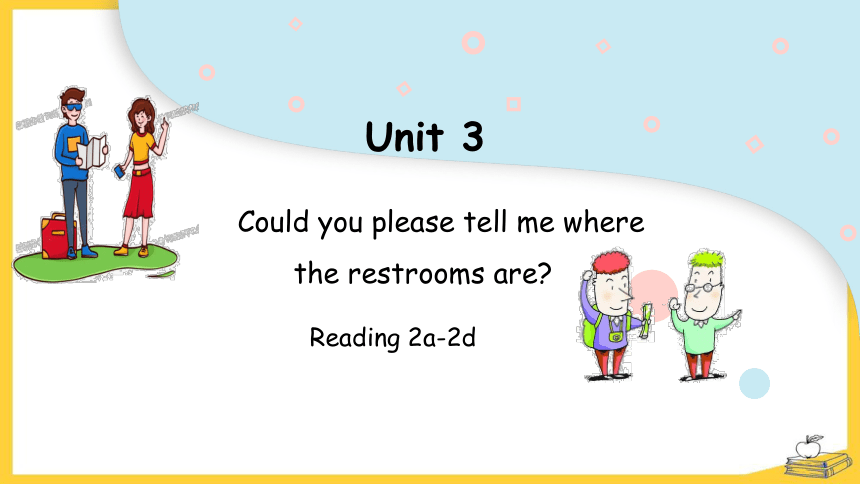 | |
| 格式 | pptx | ||
| 文件大小 | 20.9MB | ||
| 资源类型 | 试卷 | ||
| 版本资源 | 人教新目标(Go for it)版 | ||
| 科目 | 英语 | ||
| 更新时间 | 2023-08-02 14:17:40 | ||
图片预览

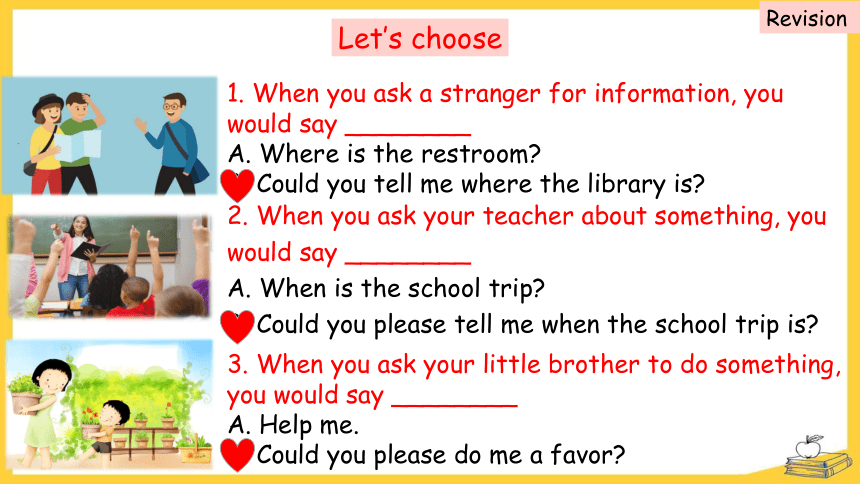

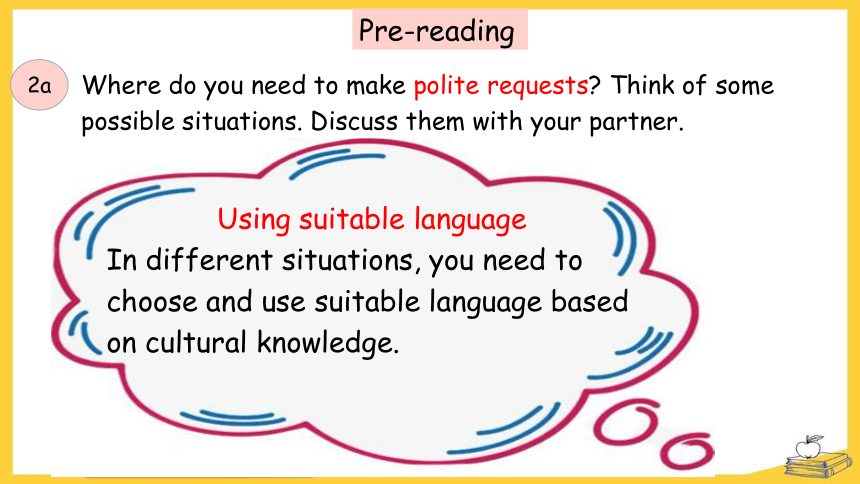
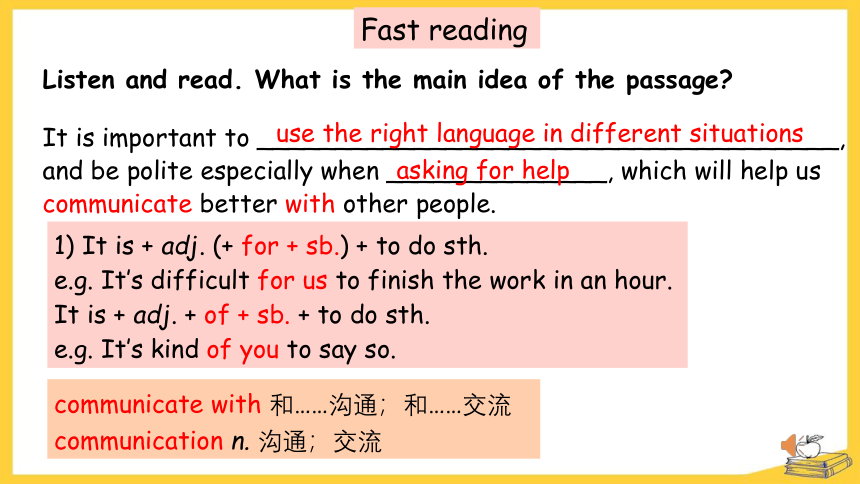
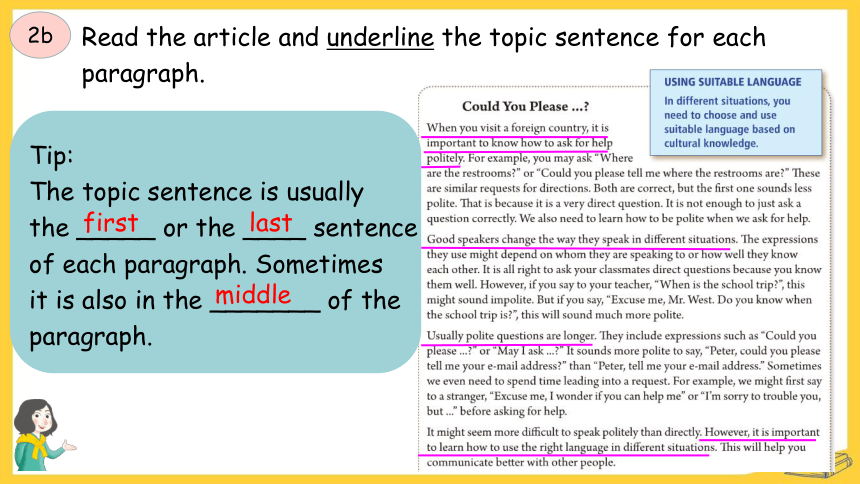
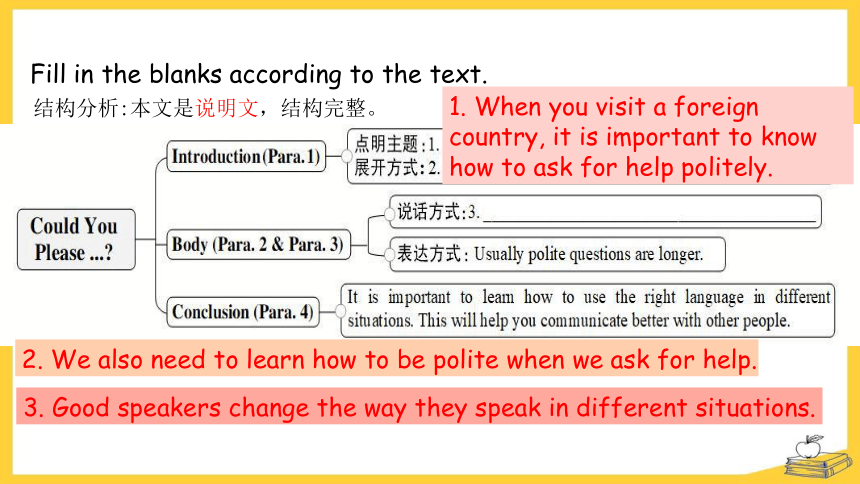
文档简介
(共16张PPT)
Could you please tell me where
the restrooms are
Unit 3
Reading 2a-2d
Revision
Let’s choose
1. When you ask a stranger for information, you would say ________
A. Where is the restroom
B. Could you tell me where the library is
2. When you ask your teacher about something, you would say ________
A. When is the school trip
B. Could you please tell me when the school trip is
3. When you ask your little brother to do something, you would say ________
A. Help me.
B. Could you please do me a favor
Lead-in
Where do you need to make polite requests Think of some possible situations. Discuss them with your partner.
Pre-reading
2a
In a foreign country.
In public places like a bank, a post office, a library, a shopping mall, etc.
At school.
At home, especially when speaking to your elders.
Using suitable language
In different situations, you need to choose and use suitable language based on cultural knowledge.
It is important to _____________________________________, and be polite especially when ______________, which will help us communicate better with other people.
Listen and read. What is the main idea of the passage
use the right language in different situations
asking for help
Fast reading
1) It is + adj. (+ for + sb.) + to do sth.
e.g. It’s difficult for us to finish the work in an hour.
It is + adj. + of + sb. + to do sth.
e.g. It’s kind of you to say so.
communicate with 和……沟通;和……交流
communication n. 沟通;交流
Read the article and underline the topic sentence for each paragraph.
Tip:
The topic sentence is usually
the _____ or the ____ sentence
of each paragraph. Sometimes
it is also in the _______ of the
paragraph.
last
first
middle
2b
Fill in the blanks according to the text.
结构分析:本文是说明文,结构完整。
1. When you visit a foreign country, it is important to know how to ask for help politely.
2. We also need to learn how to be polite when we ask for help.
3. Good speakers change the way they speak in different situations.
Read Para. 1 carefully, and answer the questions.
A. Where are the restrooms
B. Could you please tell me where the restrooms are
Q1: When you visit a foreign country, you have to ask for help, which request is better
Q2: Are the two requests correct
Q3: Why is the request B better
B is better.
Both are correct.
Because B is more polite. We also need to be polite when we ask for help.
polite ---more polite/less polite
request cn. 要求 请求
v. request
sth. /to do/that…(should)…
Careful reading
Read Para. 2 carefully, and answer the question.
depends on
how well they know each other
whom they are speaking to
How do good
speakers change
the way they
speak in
different
situations
I’m sorry to trouble you, but ...
Read Para. 3 carefully, and answer the question.
Usually polite questions are
longer.
Could you please...
May I ask...
Excuse me. I wonder if you can help me.
Longer questions can be more _________ and we need to spend time ___________________ before asking for help.
polite
leading into a request
spend some money / time on sth. 在……上花费金钱/时间
spend some money / time (in) doing sth. 花费金钱/时间做某事
It will take them about five years to build the high-speed railway. (改为同义句)
They will ______ about five years in ________ the high-speed railway.
spend
building
Read Para. 4 carefully, and answer the questions.
1. In the writer’s opinion, is it important to speak politely or directly
Neither. It is important to learn how to use the right language in different situations.
2. What’s the purpose (目的)
This will help you communicate better with other people.
It might seem more difficult to speak politely than directly.
情态动词might表达一种可能性及推测的不确定性。意思与表达可能性may相
当, 表示“有可能, 也许会”, 但语气更加委婉, 更不确定。
e.g. He might come, but it’s very unlikely.
Review
seem to be + n./adj.
seem like + n.
seem to do sth
It seems that + 句子
Direct questions Polite requests
Where are the restrooms
When is the school trip
Peter, tell me your e-mail address.
Could you tell me where the restrooms are
Excuse me, Mr. West. Do you know when the school trip is
Peter, could you please tell me your e-mail address
1.
2.
3.
1.
2.
3.
Post-reading
Read the article again and find the direct and polite questions.
2c
Request Person Place
1. Will you pass the salt
2. Do you know where I can change some money, please
3. Could you tell me what just happened
4. Could you please tell me where the nearest station is
5. Excuse me, do you know what time it begins, please
6. Let me know when you're ready, OK
7. Could you possibly tell me the way to the village school
A
B
B
B
B
B
A
at home/...
on the street
in a hall/...
on the street
on the street
in a village/...
at home/...
pass sb. sth.
= pass sth. to sb.
Read the requests below. In the second column, write A if you would say it to someone you know and B if you would say it to a stranger. In the last column, write where you think these people are.
2d
Please find the phrases or sentences
1.礼貌地请求帮助
2.听起来不礼貌
3.在不同的情景下
4.引出一个请求
5.很抱歉麻烦你.
6.更好的与他人交流
7.一个地下停车场
8.换一些零钱
1. ask for help politely
2. sound less polite / impolite
3. in different situations
4. lead into a request
5. I’m sorry to trouble you.
6. communicate better with other people
7. an underground parking lot
8. change some money
Fill in the blanks with the words in the article.
It's important for us to know how to ask for help ______. “Where are the restrooms ” sounds ____ polite than “Could you please tell me where the restrooms are ”, although they are both ______ requests for ________.
Good _______ change the expressions they use depend ___ whom they are speaking to or how ____ they know each other. You can ask your classmates _____ questions, but it is _______ to ask your teachers. ______ questions such as “Could you please ...” or “May I ask ...” are longer, so we need to spend time ______ into a _______.
In a word, we need to learn how to use the right language in _______ situations to communicate better _____ other people.
politely
less
correct
speakers
on
well
direct
impolite
Polite
leading
request
different
with
directions
Feedback
direct(adj.)-directly
direct(v)-direction-director 导演,主任,经理,董事
Summary
1. Ask for help politely: Could you please ...
2. Key phrases
3. Language points: request n.(cn.) /v.
ask for help politely
sound less polite / impolite
in different situations
lead into a request
I’m sorry to trouble you.
communicate better with other people
an underground parking lot
change some money
1)礼貌地请求帮助
2)听起来不礼貌
3)在不同的情景下
4)引出一个请求
5)很抱歉麻烦你.
6)更好的与他人交流
7)一个地下停车场
8)换一些零钱
Could you please tell me where
the restrooms are
Unit 3
Reading 2a-2d
Revision
Let’s choose
1. When you ask a stranger for information, you would say ________
A. Where is the restroom
B. Could you tell me where the library is
2. When you ask your teacher about something, you would say ________
A. When is the school trip
B. Could you please tell me when the school trip is
3. When you ask your little brother to do something, you would say ________
A. Help me.
B. Could you please do me a favor
Lead-in
Where do you need to make polite requests Think of some possible situations. Discuss them with your partner.
Pre-reading
2a
In a foreign country.
In public places like a bank, a post office, a library, a shopping mall, etc.
At school.
At home, especially when speaking to your elders.
Using suitable language
In different situations, you need to choose and use suitable language based on cultural knowledge.
It is important to _____________________________________, and be polite especially when ______________, which will help us communicate better with other people.
Listen and read. What is the main idea of the passage
use the right language in different situations
asking for help
Fast reading
1) It is + adj. (+ for + sb.) + to do sth.
e.g. It’s difficult for us to finish the work in an hour.
It is + adj. + of + sb. + to do sth.
e.g. It’s kind of you to say so.
communicate with 和……沟通;和……交流
communication n. 沟通;交流
Read the article and underline the topic sentence for each paragraph.
Tip:
The topic sentence is usually
the _____ or the ____ sentence
of each paragraph. Sometimes
it is also in the _______ of the
paragraph.
last
first
middle
2b
Fill in the blanks according to the text.
结构分析:本文是说明文,结构完整。
1. When you visit a foreign country, it is important to know how to ask for help politely.
2. We also need to learn how to be polite when we ask for help.
3. Good speakers change the way they speak in different situations.
Read Para. 1 carefully, and answer the questions.
A. Where are the restrooms
B. Could you please tell me where the restrooms are
Q1: When you visit a foreign country, you have to ask for help, which request is better
Q2: Are the two requests correct
Q3: Why is the request B better
B is better.
Both are correct.
Because B is more polite. We also need to be polite when we ask for help.
polite ---more polite/less polite
request cn. 要求 请求
v. request
sth. /to do/that…(should)…
Careful reading
Read Para. 2 carefully, and answer the question.
depends on
how well they know each other
whom they are speaking to
How do good
speakers change
the way they
speak in
different
situations
I’m sorry to trouble you, but ...
Read Para. 3 carefully, and answer the question.
Usually polite questions are
longer.
Could you please...
May I ask...
Excuse me. I wonder if you can help me.
Longer questions can be more _________ and we need to spend time ___________________ before asking for help.
polite
leading into a request
spend some money / time on sth. 在……上花费金钱/时间
spend some money / time (in) doing sth. 花费金钱/时间做某事
It will take them about five years to build the high-speed railway. (改为同义句)
They will ______ about five years in ________ the high-speed railway.
spend
building
Read Para. 4 carefully, and answer the questions.
1. In the writer’s opinion, is it important to speak politely or directly
Neither. It is important to learn how to use the right language in different situations.
2. What’s the purpose (目的)
This will help you communicate better with other people.
It might seem more difficult to speak politely than directly.
情态动词might表达一种可能性及推测的不确定性。意思与表达可能性may相
当, 表示“有可能, 也许会”, 但语气更加委婉, 更不确定。
e.g. He might come, but it’s very unlikely.
Review
seem to be + n./adj.
seem like + n.
seem to do sth
It seems that + 句子
Direct questions Polite requests
Where are the restrooms
When is the school trip
Peter, tell me your e-mail address.
Could you tell me where the restrooms are
Excuse me, Mr. West. Do you know when the school trip is
Peter, could you please tell me your e-mail address
1.
2.
3.
1.
2.
3.
Post-reading
Read the article again and find the direct and polite questions.
2c
Request Person Place
1. Will you pass the salt
2. Do you know where I can change some money, please
3. Could you tell me what just happened
4. Could you please tell me where the nearest station is
5. Excuse me, do you know what time it begins, please
6. Let me know when you're ready, OK
7. Could you possibly tell me the way to the village school
A
B
B
B
B
B
A
at home/...
on the street
in a hall/...
on the street
on the street
in a village/...
at home/...
pass sb. sth.
= pass sth. to sb.
Read the requests below. In the second column, write A if you would say it to someone you know and B if you would say it to a stranger. In the last column, write where you think these people are.
2d
Please find the phrases or sentences
1.礼貌地请求帮助
2.听起来不礼貌
3.在不同的情景下
4.引出一个请求
5.很抱歉麻烦你.
6.更好的与他人交流
7.一个地下停车场
8.换一些零钱
1. ask for help politely
2. sound less polite / impolite
3. in different situations
4. lead into a request
5. I’m sorry to trouble you.
6. communicate better with other people
7. an underground parking lot
8. change some money
Fill in the blanks with the words in the article.
It's important for us to know how to ask for help ______. “Where are the restrooms ” sounds ____ polite than “Could you please tell me where the restrooms are ”, although they are both ______ requests for ________.
Good _______ change the expressions they use depend ___ whom they are speaking to or how ____ they know each other. You can ask your classmates _____ questions, but it is _______ to ask your teachers. ______ questions such as “Could you please ...” or “May I ask ...” are longer, so we need to spend time ______ into a _______.
In a word, we need to learn how to use the right language in _______ situations to communicate better _____ other people.
politely
less
correct
speakers
on
well
direct
impolite
Polite
leading
request
different
with
directions
Feedback
direct(adj.)-directly
direct(v)-direction-director 导演,主任,经理,董事
Summary
1. Ask for help politely: Could you please ...
2. Key phrases
3. Language points: request n.(cn.) /v.
ask for help politely
sound less polite / impolite
in different situations
lead into a request
I’m sorry to trouble you.
communicate better with other people
an underground parking lot
change some money
1)礼貌地请求帮助
2)听起来不礼貌
3)在不同的情景下
4)引出一个请求
5)很抱歉麻烦你.
6)更好的与他人交流
7)一个地下停车场
8)换一些零钱
同课章节目录
- Unit 1 How can we become good learners.
- Section A
- Section B
- Unit 2 I think that mooncakes are delicious!
- Section A
- Section B
- Unit 3 Could you please tell me where the restroom
- Section A
- Section B
- Unit 4 I used to be afraid of the dark.
- Section A
- Section B
- Unit 5 What are the shirts made of?
- Section A
- Section B
- Review of Units 1-5
- Unit 6 When was it invented?
- Section A
- Section B
- Unit 7 Teenagers should be allowed to choose their
- Section A
- Section B
- Unit 8 It must belong to Carla.
- Section A
- Section B
- Unit 9 I like music that I can dance to.
- Section A
- Section B
- Unit 10 You're supposed to shake hands.
- Section A
- Section B
- Review of Units 6-10
- Unit 11 Sad movies make me cry.
- Section A
- Section B
- Unit 12 Life is full of the unexpected
- Section A
- Section B
- Unit 13 We're trying to save the earth!
- Section A
- Section B
- Unit 14 I remember meeting all of you in Grade 7.
- Section A
- Section B
- Review of Units 11-14
